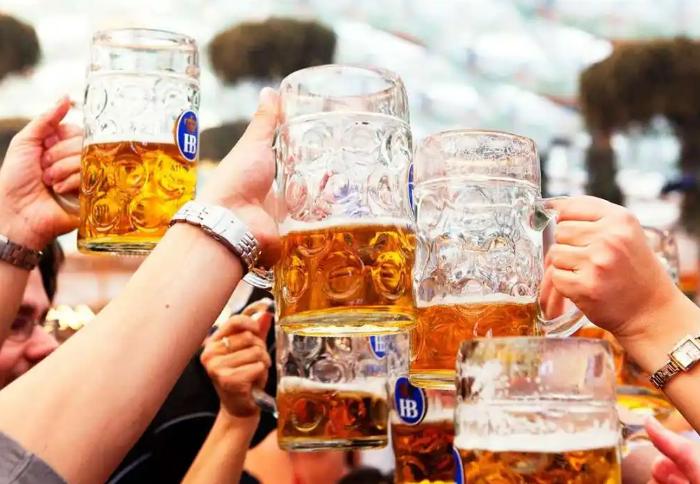
Since 2013, the average German person consumed 107 liters of beer per year. However, by 2023, this had dropped to 88 liters, and by 2025, it might even break this lowest record. But in 2024, the 172-year-old Langbrenner Brewery in northern Bavaria completely shut down. The former head of the brewery, Richard Hopf, said: "The brewery is suffering greatly. When sales keep declining and costs keep rising, there is almost no room for long-term considerations." Nowadays, in Germany, the key issue is not that many people stop drinking beer, but that the second bottle of beer has disappeared, and the scene of having a leisurely drink after dinner or having the third drink before a party has vanished. This year, German beer sales still dropped by nearly 7% in the first five months. The entire industry has decreased by approximately 2.3 million hectoliters compared to the same period last year, which is roughly twice the decline in the previous year during the same period. In North Rhine-Westphalia alone, the market has lost over 40 million hectoliters. Even during the pandemic lockdown in 2021, the sales of beer were higher than now.
For young Germans, beer is no longer a necessity. This phenomenon not only severely impacts the German beer industry but also brings complex and multi-faceted impacts on the business environment. One is the impact on the business structure. In recent years, 52 breweries in Germany have closed, marking the largest decline in 30 years. About 1,500 breweries are facing survival pressure, and the industry size continues to shrink. For example, the Langbrenner Brewery, with a history of 172 years, was forced to shut down due to declining sales and rising costs, highlighting the severity of the industry's winter. Beer production is a labor-intensive industry, and the closure of breweries led to a reduction in direct employment. At the same time, the upstream and downstream industries (such as malt supply, logistics, and packaging) were also affected, indirectly affecting the stability of the employment market. German beer exports decreased by 6% compared to 2014, and the decline in overseas demand exacerbated domestic overcapacity. Even during the pandemic lockdown in 2021, sales of beer were higher than now.
Secondly, it has an impact on market competition and enterprise transformation. Companies like Colognebach have quickly established a foothold in the non-alcoholic beer market through technological advantages and brand influence. In 2024, the production of this category nearly doubled in the past ten years, accounting for 8.9% of the retail market share, becoming a new growth point for the industry. Large breweries also consolidate their positions through acquisitions of mature brands. Small breweries, due to limited funds, could not afford the investment in "post-detoxification technology" (over one million euros), and could only adopt the early termination fermentation technology, resulting in an overly sweet taste of non-alcoholic beer that is difficult to compete with traditional flavors. Under the intensified market competition, large breweries squeeze the survival space of small breweries through price wars and channel monopolies. Some breweries expand new product categories such as fruit-flavored beer and non-alcoholic cocktails, highlighting the concepts of health and freshness to adapt to the consumer psychology of "abstaining from alcohol but not from socializing".
Thirdly, it has an impact on the economy. German beer exports decreased by 6% compared to 2014, and the decline in overseas demand exacerbated domestic overcapacity. Although export stability is better than the domestic market, the rise of global trade protectionism and geopolitical conflicts (such as the Russia-Ukraine conflict) have led to blocked export channels. The government needs to support small breweries through tax incentives, energy subsidies, etc., for transformation, such as lowering the VAT rate for non-alcoholic beer and encouraging technological innovation. Industry associations promote technology sharing to help small breweries break through the bottlenecks in non-alcoholic beer production and promote the overall transformation of the industry.
In conclusion, the current predicament of German breweries, from industry contraction to changes in market competition, from the pressure of enterprise transformation to the impact of macroeconomic correlations, impacts the business sector in all aspects. For the entire business environment, it also provides an opportunity to review market changes and adjust industrial policies. How to turn challenges into opportunities in the future is something that deserves continuous attention and in-depth reflection.

According to a recent report by Rich Asplund, a columnist for Barchart, the global sugar market is currently experiencing a complex and profound supply-demand game.
According to a recent report by Rich Asplund, a columnist f…
On January 13th local time, the three major US stock indice…
Recently, the 2026 edition of the MIT Technology Review lis…
On January 15, 2026, the US military announced the seizure …
At the 2026 J.P. Morgan Healthcare Conference, a joint anno…
For much of 2025, the market was rethinking whether the dol…